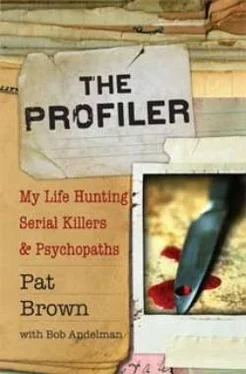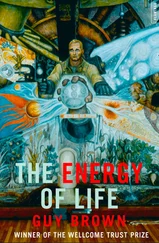There were many programs in psychology-which people often think is what criminal profiling is based on. A profiler is supposed to understand the behavior and the mind-set of the killer, but little of psychology is ever about aberrant behavior and psychopathy. Most of what was taught was general psychology, which didn’t apply to murderers and psychopaths. The few courses I found that focused on deviant psychology and mental disorders were all about treatment, and I couldn’t have cared less about curing rapists and murderers. I figured that by the time you were a bona fide serial killer, you were a hopeless case and a nasty piece of work. I am not one of those who believe that psychologists can rehabilitate a guy who has killed ten women. And even if he could be rehabilitated, he doesn’t deserve the chance. I always say, when you bring the dead woman back to life, then you can give the killer treatment.
So how was I going to learn criminal profiling?
The only straight-line methodology I found was joining the FBI. First of all, I was too old; they wouldn’t even let me try. Second, when you join the FBI, you don’t just become a criminal profiler. You can’t say, “Now that I have joined, this is what I want to do.” You become an agent, and twenty years later, you might still be sitting in Iowa doing whatever FBI agents do in Iowa. Maybe someday, if you were really, really lucky, you’d become a criminal profiler; but then again maybe you wouldn’t. So for me, the FBI was out. I had to find some other way. What was left? That’s what I wanted to know.
There was nothing out there, apparently, so I concluded the only solution was to create my own criminal profiling program, study it on my own, and take advantage of anything complementary that I could find.
I found courses offered online by Brent Turvey, who has a master’s degree in forensic science. Turvey was one of the first independent profilers in the country and he strongly encouraged the Sherlock Holmes scientific method of deduction that he called “Deductive Profiling.” He may have a master’s in forensics but he clearly studied much on his own to learn all the other skills necessary to profiling. These weren’t accredited college courses, but they were informative and I was gathering my education from every existing source that I could find.
I took all the classes that Turvey offered, purchased the recommended textbooks, and learned a great deal. That opened the door to attending a serial homicide conference in Ann Arbor, Michigan, and a death investigation conference in Florida. These experiences exposed me to the skills and tools I needed, acquired at the feet of some of the world’s most accomplished detectives and crime analysts.
On my own, I read and studied some four hundred books related to profiling, crime analysis, serial homicide, and forensics over the next four years. There is nothing better for studying than hours and hours of quiet time at the hospital waiting for the doctor to come in, the surgery to end, and the patient to wake up.
Later on, I earned a master’s degree in criminal justice because I wanted to learn more about police operations and procedures and the challenges of the criminal justice system in general. It wasn’t criminal profiling, but it was an issue with which I was concerned.
The fact is that people are stuck on the concept that you must attend a particular program that certifies you as a criminal profiler. But to date, there are no specific requirements for participation in the field. Any way that you learn, as long as you gain the skills and you understand the field, is an education. A college program is a wonderful opportunity if such a program exists (and today there is a college-level criminal profiling certificate program available that I developed for Excelsior College) but, even with a college program under one’s belt, learning is an ongoing process and one should always seek new information and skills.
During that time, I began to develop my own idea of what was wrong with the present practice of criminal profiling. I disagreed with a lot of what I read. Much of it didn’t even make sense. Some of the methodologies I was reading about seemed like hocus-pocus to me. I couldn’t fathom anything scientific behind certain theories that added up to nothing more than picking something out of a hat.
There was sleight-of-hand being sold by a few profilers who had been practicing for a long time. I’m not saying they didn’t do a good job when they worked their cases; I’m not saying they weren’t good profilers. But by the time they shared their techniques in books, everything became a show of “How brilliant I am” and “How every profile I did matched the suspect perfectly!”
Oh, please! There’s no way you could have gotten those things right, because the methodology didn’t make any sense. You couldn’t have known the things you claimed. Profiles are science, not magic.
I watched a television show about famed FBI profiler John Douglas and a case he worked on in Alaska. On the show, Douglas theorized that when they found the perpetrator, he would have a stutter, and he did! Now how in the world would anybody-I don’t care how much training you’ve got-figure out that a guy who committed a particular crime stutters? From where do you get that? Well, Hollywood twisted the story around like they so often do.
It turned out that the police already had a suspect in mind, and they asked Douglas if he thought that the man they had in custody could be the serial killer, this man who owned a small plane and stuttered. Douglas profiled the crime and, since the profile matched the police suspect, he said the killer would be a stutterer. He already knew that the guy stuttered, but the television show didn’t make that clear. In his book Mindhunter, Douglas points out that he knew the suspect stuttered, but Hollywood made him seem like he could pick this trait out because of his brilliance.
While the Hollywood spin on profilers makes for exciting reading, students of profiling are often mystified and discouraged because they can’t understand how they could ever possibly figure the same things out-what color car the suspect drives, that he likes to watch the news, that he is a sports lover. I have news for them. I can’t figure those things out, either.
SOMETIMES, A PROFILER applies inductive profiling to a case.
A sexual homicide is almost always committed by males. How often do you see a woman convicted of sexual assault? Almost never. It’s an extremely unusual crime. A profiler could take statistical information and say, “If you have a girl who’s been raped, then I’m going to say it was by a man.” Anyone can guess that. And most males who commit crimes are between twenty-two and thirty-two. We can start creating a profile by staying with the safe bets: “The sexual assaults were committed by a man between the ages of twenty-two and thirty-two.” Then if a guy committed a number of poorly planned crimes, all locally, I could say what he’s not doing well in his life: he’s probably unable to maintain a job or a relationship. And he’s not very clever. I bet I will still be batting close to a thousand with this profile.
But unusual guesses, like a stutter, could not possibly be known logically or statistically.
As I learned about profiling, I discovered that there was a great deal of mythology about the field-promoted by profilers themselves-to make profilers seem like some kind of gods. They want the police and general public believing there are only so many people in the world who could ever do this, because they’re so brilliant and gifted. They can simply look at a scene and-voilà!-they know all the answers. It’s ridiculous.
Brent Turvey pushed for establishing an increasingly scientific practice of criminal profiling. I support his efforts and have continued to promote the deductive method of criminal profiling-one based on evidence, the scientific method, and solid explanations for profile determinations.
Читать дальше












